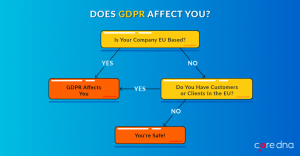GDPR: The tipping point for a US Privacy Act?
By Harith Elrufaie | March 6, 2019
GDPR, which is a short for General Data Protection Regulation, was probably in the top ten buzz words of 2018! For many reasons, this new regulation fundamentally reshapes the way data is handled across every sector. According to the new law, any company that is based in the EU, or has a business with EU customers must comply with the new regulations. Failing to comply will result in fines that could reach 4% of annual global turnover or €20 Million (whichever is greater). Here in the US, Companies revamped their privacy policies, revised architectures, data storage and encryption policies. It is estimated that US companies spent over $40 billions to be GDPR compliant.

To be a GDPR compliant, the company must:
1. Obtaining consent: consents must be simple. This means complex legal terms and conditions are not accepted.
2. Timely breach notification: if a security data breach occurs, the company must not only inform the users, obut must also be within 72 hours.
3. Right to data access: the user has the right to request all their stored data and for free.
4. Right to be forgotten: the user has the right to request the deletion of their data any time and for free.
5. Data portability: the user has the right to obtain their data and reuse the same data in a different system.
6. Privacy by design: calls for the inclusion of data protection from the onset of the designing of systems, rather than an addition.
7. Potential data protection officers: to appoint Data Protection Officer (DPO) to oversee for some cases.
Is this the tipping point?
The last few years were a revolving door of data privacy scandals; the shutdown of websites, data mishandling, public apologies, and CEO’s testifying before US Congress. A question that pops in the mind of many is will a GDPR similar act appear in the United States sometime soon?
The answer is maybe.
In January 2019, two U.S. senators, Amy Klobuchar and John Kennedy, introduced the Social Media Privacy and Consumer Rights Act, a bipartisan legislation that will protect the privacy of consumers’ online data. Having senator Kennedy is no surprise to many. He has been an advocate of data privacy and been vocal about Facebook’s user agreement. In Mark Zuckerberg’s testimony before the Congress, senator John Kennedy said: “Your user agreement sucks. The purpose of that user agreement is to cover Facebook’s rear end. It’s not to inform your users of their rights.” The act is very similar to GDPR in many forms. After reading the bill, I could not identify anything unique or different from GDPR. While this is a big step towards consumers data privacy, many believe such measures will never become a law, because of the power of the tech lobby and the lack of public demand for data privacy overhaul.
The second good move happened here in California with the new California Consumer Privacy Act of 2018. The act grants consumers the right to know what data businesses and edge providers are collecting from them and offers them specific controls over how that data is handled, kept, and shared. This new act will take effect on January 1st of 2020 and will only apply to the residents of California.
To comply with the California Consumer Privacy Act, companies must:
1. Disclose to consumers the personal information being collected, how it is used, and to whom it is being disclosed or sold.
2. Allow consumers to opt out of the sale of their data.
3. Allow consumers to request the deletion of their personal information.
4. To offer an opt-in services for consumers under the age 16.
While the United States has a rich history of data protection acts, such as HIPPA, COPPA, etc., there is no single act to address online consumers privacy. Corporates have benefited for many years by invading our privacy and selling out data without our knowledge. It is time to make an end to this and voice our concerns and demands to our representatives. There is no better time than now for an online consumers privacy act.
—
Sources:
- https://eugdpr.org
- https://www.coredna.com/blogs/general-data-protection-regulation
- https://www.prnewswire.com/news-releases/us-companies-projected-to-spend-417-bn-on-compliance-with-the-eus-gdpr-legislation-682812501.html
- https://www.marketwatch.com/story/amy-klobuchar-john-kennedy-again-push-bipartisan-online-privacy-legislation-in-senate-2019-01
- https://www.congress.gov/bill/116th-congress/senate-bill/189
- https://leginfo.legislature.ca.gov/faces/billTextClient.xhtml?bill_id=201720180AB375&search_keywords=Consumer+Privacy+Act+of+2018
